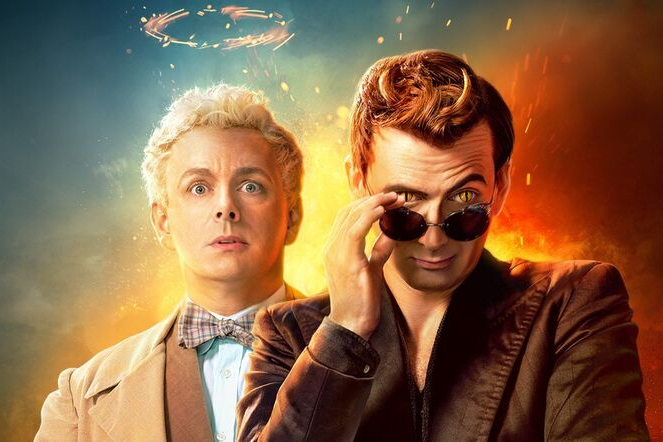Good Omens was a delightful show. Sharp and witty, colourful and layered, it had a little something for everyone. But most extraordinary about this show was the relationship between the two main protagonists, the angel Aziraphale and the demon Crowley. Many fans feel this is a romantic relationship. It really doesn’t help matters that Neil Gaimen, the writer of the show, retweets fans cosplaying as Aziraphale and Crowley getting married. This is adorable on so many levels. The ship itself works at large to represent a gay relationship, one that has become known as Ineffable Husbands – a play on the fact that Aziraphale often says in the show that God’s plan is “ineffable” – it is beyond the mortal palate of description. And, I argue, so too is their relationship.
This article will contain mild spoilers for Good Omens.

David Tenant, who portrays Crowley, said, “they’ve become each other’s sort of significant other, really. They’ve only got each other to rely on.” Similarly, Michael Sheen, who plays Aziraphale, spoke about the dynamic:
“I wanted to play Aziraphale being sort of in love with Crowley. They’re both very bonded and connected anyway, because of the two of them having this relationship through history – but also because angels are beings of love, so it’s inevitable that he would love Crowley.”

The above gifs are really only a taste of the moments that the two characters share, which seem to show a deeper relationship that goes beyond friendship. The director of the show, Douglas Mackinnon, said “Michael Sheen is a hundred per cent sure that Aziraphale falls in love with Crowley, and that moment occurs when the bomb drops on the church” – to which every shipper can scream, “CALLED IT!”
I mean, really. Look at his face. Look at it.

While I am behind the ship, I also find that there’s a lot valuable in the non-specificity of the relationship. Would I be happy if they banged? Yes. Am I also happy that they didn’t, but their love story is true, in whatever form that means for them? Hell yes. It’s just another step towards breaking down labels, for wrestling control back from stereotypes and roles. It’s just another movement towards showing the non-binary ways of life that have always been there, at times hiding, at others fighting back. But always, always present, and always valid.
Neil Gaiman himself says, “I wouldn’t exclude the ideas that they are ace, aromantic, or trans. They are an angel and a demon, not male humans, as per the book …”

They’re angels and demons – they do not fit into human labels of gender or sexualities. As Sheen says in regards to erotic, platonic or romantic love, “Oh, those are human, mortal labels!” They can be considered an asexual couple if you like, or they can be considered a gay couple too. Or perhaps they can just be friends, with that particular deep bond that you rarely find, and dub, as Crowley did with Aziraphale: “best friends”.
Either way, Good Omens supplies you with whatever love story you want or need. If you’re looking for representation, it’s there, entirely up for your own interpretation. It’s a versatile piece, with a huge amount of heart, regardless of the type of love being shown.

Satisfaction with this non-binary representation seems to be somewhat split online. Some say it wasn’t explicit enough, such as Reddit user nilpotentOperator:
“Cool. Next time show it in the actual source material (and for more than just one nebulous scene that could easily be interpreted as crossdressing) and don’t make us rely on the author’s Twitter for confirmation.”
Others believe the representation was more than enough:
tgjer says: “I really like that they established pretty explicitly that “gender” as we know it doesn’t apply to Angels or Demons at all. So we see a wide range of gender expressions among them, but none of them are “men” or “women”.”
To which another user, SpookyOkay, responded: “Yeah! It was so… comfortable to watch, it was like being around friends.”
There’s also the worry that this is queerbaiting, in the sense that it teases a relationship, but doesn’t realise it. As an argument against that, I would have to say that this excludes the asexual community as possessing valid romantic relationships. Physical intimacy isn’t required for “true love”, and Good Omens is a reminder of that.
Good Omens overcomes both intertextual borders in the relationships, a demon and an angel, as well as binary love borders. The versatility of their relationship is perhaps what makes it the best it can be. There’s something in that show for everyone. In the end, regardless of everything, they were great godparents to the Anti-Christ – who wasn’t really the Anti-Christ. Ah, they tried.

